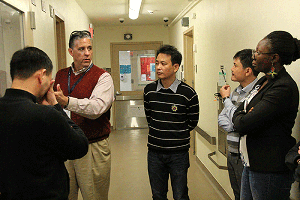
Ben Fontes has been in the biosafety field for 29 years. If it were not for the mentors he had when he was starting out, he does not believe he would be in the position he is in today. Fontes, Yale’s biosafety officer in the Office of Environmental Health and Safety, is now passing on the knowledge he has accrued over the years to help up and coming professionals in countries that are currently developing biosafety programs.
Fontes is part of the Biorisk Management Advisor Development and Mentorship Program, informally known as the “Biosafety Twinning Program”. The program was developed nine years ago by the Sandia National Laboratories Global Chemical Biological Security team as a way for experienced biosafety professionals to mentor newly appointed or inexperienced members of the biosafety field in countries where biorisk management concepts and principals are relatively new. This year, biosafety professionals from the United States, Mexico and the United Kingdom were paired up with a partner “or twin” from Nigeria, Mali, Somalia or Turkey. Through these relationships, they work to develop programs, improve existing systems, increase awareness and establish biorisk management as a professional pursuit at their home institutions and labs.
“It seemed interesting to me because it was helping others just starting out in their biosafety careers,” Fontes said.
With funding by the U.S. Department of State’s Biosecurity Engagement Program and the U.S. Defense Threat Reduction Agency, this year’s program kicked off with a five-day orientation in Kota Kinabalu, Malaysia in September. Pairs were formed and spent time developing detailed project plans, goals, objectives, tasks and responsibilities. Over the next six months, the partners are in regular contact with each other to work on their project plan. They provide monthly progress reports to Sandia National Laboratories Global Chemical Biological Security team.
Fontes has been affiliated with the program since 2011 and has been paired with a twin since 2015. His partners have come from Yemen, the Kurdistan Regional Government in Iraq, Morocco, Egypt, Tanzania and Turkey.
On a rainy Friday in November, several of the up and coming biosafety professionals visited Yale University to get a first-hand look at its biosafety practices. They heard presentations from Yale researchers, toured various labs and biosafety-related areas and attended a Biosafety Level 3 training as well as more detailed breakout information sessions. The group arrived in New Haven after attending the 62nd Annual Biosafety and Biosecurity Conference (ABSA) in Birmingham, AL.
Along with the “twins” from Algeria and Mali, biosafety professionals from Vietnam joined the trip to Yale as the program is looking to expand into their country.
Zachariah Ephraim Makondo, Fontes’ 2018 partner from Tanzania, also made the trip after presenting his work at the ABSA conference. Their project was to establish a biorisk management framework, including a biosafety committee and biosafety manual, for the Tanzania Veterinary Lab Agency.
“The programs are providing people opportunities in a place where they don’t currently exist,” Fontes said. “These are the future mentors for their countries.”